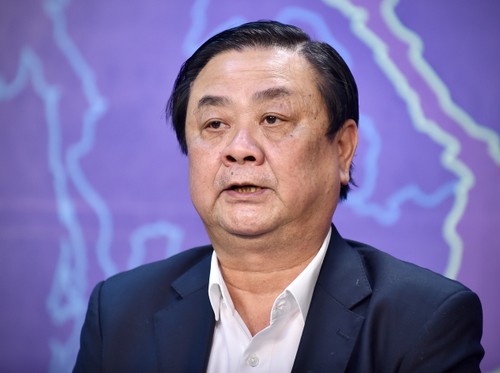Vietnam now has 5 hi-tech agricultural zones and 18 hi-tech agricultural regions.
Applying technology has created opportunities for Vietnamese farm produce to be exported and has rewarded the determination of Vietnamese farmers and enterprises to better themselves. Dr. Tran Duy Khanh, Director of the APEC Institute for Business Studies and Training, will tell us more about this.
Reporter: Dr. Tran Duy Khanh! How successful has the application of technology to agricultural production been so far?
Khanh: “Hi-tech agriculture in Vietnam is still new, but there have already been some successful models. The animal husbandry of Vinamilk, for example. All its grass fields are automatically irrigated. And the cow herds are automatically watered. Chips have been installed to track and control the entire process. Flower cultivation in Lam Dong province is another example. Da Lat flowers grown in greenhouses or net houses with automatic temperature control and irrigation are widely exported. This is an object lesson in successful high-tech application. High-tech is being successfully applied in Vietnam in agriculture, forestry, aquaculture, and processing.”
Reporter: How widespread is high-tech agriculture?
Khanh: I know many businesses that want to import advanced production lines. Farmers are changing their mindset. They now want to participate in the production chain from planting and harvesting to processing, exporting, and selling agricultural products to end-users. High-tech agriculture is inevitable in Vietnam, just as it has been for advanced countries around the world. Many models of applying high-tech to agricultural production have engaged the effort and will of people in all regions of Vietnam.
Reporter: What are the prospects of Vietnamese agriculture?
Khanh: Vietnamese agriculture has great potential, because Vietnam is a tropical country with flowers and fruits available in all four seasons. Our products are diverse all year round. We believe that in the future, when Vietnam has successfully applied high-tech to mass production, it will improve efficiency, create a breakthrough in farm produce, better satisfy the needs of society, and build a foundation for sustainable agriculture.
Shift from selling what we have to selling what the markets want
 Le Minh Hoan, Minister of Agriculture and Rural Development. Photo: VGP Le Minh Hoan, Minister of Agriculture and Rural Development. Photo: VGP |
At the closing ceremony of the 5th plenum of the 13th Party Central Committee in May, Party General Secretary Nguyen Phu Trong said agriculture is one of Vietnam’s strengths and we must base our agricultural production and trade on science, technology, and innovation and develop both our domestic and export markets. Le Minh Hoan, Vietnam’s Minister of Agriculture and Rural Development, talked to a VOV reporter about tapping the strength of Vietnamese agricultural products.
Reporter: Mr. Minister, what is your assessment of the production and export of Vietnamese agricultural products?
Minister: Vietnam has diversified its products and markets and now exports to some very demanding markets. We can guarantee the quality of Vietnamese agricultural products to those markets. Businesses and farmers have switched from selling what they have to selling what the market wants. Our exporting high-quality rice to the European market and the Japanese market shows that we are now more focused on quality than on quantity. We understand and focus on the requirements of each individual market, whether it’s the EU, Japan, or the US.
Reporter: Does this represent a change in production thinking, Minister?
Minister: Changing our mindset we can change our life. Changing our approach, we can change our journey. Vietnamese businesses and farmers have expanded their agricultural production thinking to agricultural economic thinking. There has been a lot of research by scientists and a lot of thinking by associations and farmer organizations about how to create added value and capitalize on the trend of the agricultural economy. New agricultural models have sparked a new vitality. That’s the value of linking the State, the market, and society, and between the State, agricultural enterprises, farmers, and cooperatives.
Reporter: What are the Ministry’s orientations for building a harmonious, sustainable, multi-valued agriculture, Minister?
Minister: Today, people judge agricultural products not only on their price and quality, but also on how their production processes affect the environment, biodiversity, greenhouse gas emissions, and climate change. At COP26 in October 2021 in the UK, Vietnam made a commitment to achieve net zero emissions by 2050. Vietnam wants a responsible and sustainable agriculture sector that participates in the global value chain and food supply system. These goals require concrete actions and responsibility on the part of producers, farmers, and businesses.
After decades of exporting to the most accessible markets, Vietnamese agricultural products are starting to assert their value in difficult markets. Through their efforts to integrate Vietnamese agricultural products globally, Vietnamese farmers and businesses are contributing to national prosperity and sustainable development.